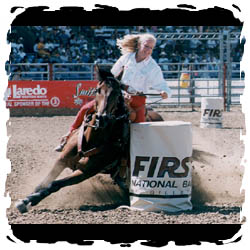Rodeo Competitor
Insider Info
Heart throbbing! That's how Mike Gill describes riding in the Calgary Stampede
when he was 12. There he was on horseback in full western wear in front of
50,000 people.
"I ended up fifth in steer riding," says the 16 year old. Across North
America, the revival of country music, cowboy boots and even line-dancing
has created new interest in everything western, including rodeo.
Gill is a member of the British Columbia High School Rodeo Association.
He competes in team roping, steer wrestling, and bull riding.
"I got into it from a couple friends who are older. They rodeo for a living
and they started me out. I've been hooked ever since," says Gill.
"Sixty percent of our membership is first-generation rodeo, meaning the
parents aren't involved," says Kent Sturman. He is the head of the National
High School Rodeo Association based in Denver, Colorado.
 |
| As you can see, the rodeo is not just for cowboys. |
| Courtesy: Kent Sturman of the National High School Rodeo Association |
The NHSRA has an annual membership of over 13,000 students from 38 states
and four provinces. It sanctions over 1,100 rodeos each year. Sturman says
that makes it one of the fastest growing youth organizations in the nation.
"These things can go in cycles, but our numbers have held steady the last
couple of years," he says. The National Intercollegiate Rodeo Association
is a recognized rodeo organization at over 135 colleges and universities.
Members compete in approximately 10 rodeos a year. They try to earn a trip
to the college national finals rodeo.
"You're on a team at the college level," says Nora Hunt. "You practice
as a team just like any other college sport, except you can win individual
titles as well."
Hunt's team from the University of Nevada at Las Vegas won the nationals
for breakaway roping, goat tying and barrel racing. With three events, she
practices a minimum of two hours a day.
"It's kind of like doing a job and not getting paid. You practice all week
long, and at the end of the week you go to the rodeo," she says.
At the college and high school level, winning at the rodeo can win you
scholarships and prizes. But even the most ardent rodeo fan will tell you
that does little to offset the costs of participating.
"You can't win all the time," says Gill. "And you need money to feed your
horses, and pay for gas, hotel and food along the way."
"It's costly, pretty costly," agrees Neil Gill, Mike's dad. He's the secretary
of the BCHSRA. "So far this year, I've spent $1,600 in travel for my son and
myself."
"Unlike other school sports, we don't get any tax dollars," explains Sturman.
"But I don't know if I could give you a figure. If you're a bull rider you
need your own bull rope, and chaps and a safety vest. That starts at $250
and can go up to $500 or $600."
There is also a physical cost to rodeo. Injuries go with the territory.
"I had a saddle bronco horse step on me," says Gill. "He tore my pec [pectoral
muscle] and I was out for a week."
Sturman says the association stresses physical fitness for both horse and
rider. "It helps you perform better, and prevents injuries," he says.
Sturman says there's also room at the rodeo for physically challenged riders.
"I've known several over the years," he says. "Some events [like cutting,
or separating cattle from a herd] don't require the participants to leave
their horseback."
While many high school and college rodeo participants will go on to compete
in professional rodeo, Sturman says the percentage of cowboys and cowgirls
who can make a living at it is very small.
"One thing about rodeo is you don't get paid if you lose. Unlike basketball,
where you're paid to practice and paid to play."
However, he says there are many careers which can keep you involved in
rodeo. "There are stock contractors, promoters and producers, announcers,
judges, specialty acts, photographers, rodeo marketing and media, and national
office staff."
Getting Started
The national office would be glad to refer you to a NHSRA branch in your
region. The NHSRA offers members a chance to compete and training.
Sturman says a lot of professional cowboys put on rodeo schools
as well. "It is a good opportunity to go and learn techniques, safety issues
and all over physical conditioning. They're put on all across North America."
Sturman says your best bet is to go with an instructor sanctioned by the
Professional Rodeo Cowboys Association.
Associations
National High School Rodeo Association, Inc.
11178 N. Huron, Ste. 7
Denver
,
CO
80234
USA
Internet
:
http://www.nhsra.org
Professional Rodeo Cowboys Association
101 Pro Rodeo Dr.
Colorado Springs
,
CO
80919
USA
Internet
:
http://www.prorodeo.com/
Links
Teamroper.com
A site designed for team roping, or anything cowboy related
The Rodeo News
Get the latest info on what's happening in the world of rodeo
North American Riding for the Handicapped Association
If you have a disability you think will keep you out of the saddle,
this organization can help
Back to Career Cluster